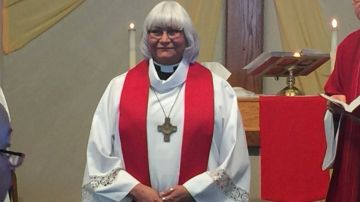Transgender Latina Makes History as First Lutheran Pastor
Nicole Garcia is a trailblazer

Photo: Facebook/Westview Church
Nicole Garcia is a trailblazer. She is a pioneer. She is a woman who’s been on a difficult journey but is finally free to be who she truly is. At 60-years-old, it’s as if Garcia has lived many lives — and in many ways she has. That road of self-discovery and acceptance has led her to this historic moment of becoming the first transgender Latina to be an Evangelical Lutheran pastor.
Garcia didn’t wake up one day and say ‘I want to be a pastor when I grow up.’ For most of her life, she didn’t have the freedom to live as her true self. Garcia was born a male, and for most of her life, she lived a life of confusion and addiction. Her family didn’t accept her. Her church didn’t either, so she left it all behind.
In an interview with NBC News, Garcia said that she often prayed for God to fix her. But God never made Garcia be comfortable as a male. Perhaps that was ultimately His answer, because years later, after many attempts to live as a male, Garcia finally was able to transition into becoming a woman. Now at 60, Garcia is helping others find God.
She is now leading the congregation as the first transgender Latina pastor at Westview Lutheran Church in Boulder, Colorado.
“Nobody can question my faith, my devotion to Christ, my devotion to the church. That’s why I’m the pastor here,” Garcia told NBC News. “Being trans is secondary.”
Garcia isn’t the first transgender pastor. Several churches across the country have not only embraced the transgender community as new congregants but also as church leaders. This year, Erica Saunders, a transgender woman, was officially named as lead pastor at Peace Community Church in Oberlin, Ohio. Last year, Rev. Peter R. Beeson was named lead pastor at Hoboken’s St. Matthew Trinity Lutheran Church.
In an interview with HuffPost, Beeson said that it is these revolutionary moments of acceptance that show others what it means to have compassion for all.
“The renaming ceremony provided an opportunity … for us to show the broader world that there are faithful Christians who support LGBTQ+ people and offer a counter-message to the one of fear and hate so prevalent today,” Beeson said. “Particularly for people who may be pondering their gender identity or sexual orientation ― particularly young people ― this provided us an opportunity to say that God loves you and that all people are created in the image of God.”

















